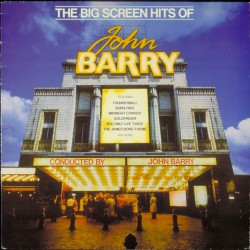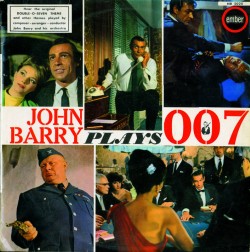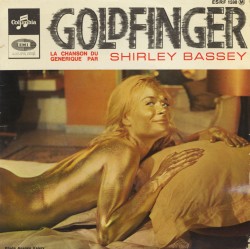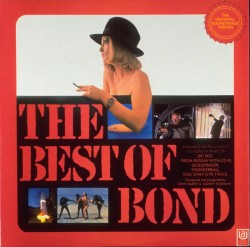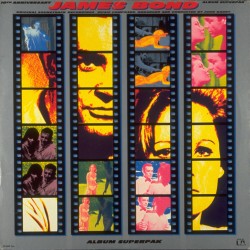King's Conversation
Most of the millions who have been escaping into the darkness of the cinema during the last decade will agree that films have gained enormously in size and impact in those years, but few perceive how much is due to the revolution in film scoring pioneered by the two men KING brings together this month.
Mancini takes justifiable pride in having freed the cinema from the 'Hungarian' school of composers. It is quite staggering to realise that only six years ago in the United States, where jazz in its various forms had developed an unprecedented musical power and worldwide acceptance, film music was still firmly rooted in Nineteenth Century Europe, engulfing audiences in endless classical strings and choirs. The pop explosion, which brought the modern jazz idiom into the commercial cinema, adding a new dimension of credibility and excitement to the actors and the action, derives almost entirely from the success of Mancini's approach to Peter Gunn, a break-away American television series of the early Sixties.
In his way, John Barry performed his own miracles in this country. Most of those who remember his name, know him as the leader of the John Barry Seven, Britain's prototype pop group. It would be easy to dismiss him as a likely young lad who rode to early riches on the pop bandwagon, thought of a good number for James Bond, and let the pop-conscious film producers do the rest.
This simple-minded myth takes no account of the great technical competence and originality with which he handles orchestras and arrangements and the many years of hard academic study before the Seven were even thought of the idea of a pop group in fact grew out of the decline of Britain's big bands in the Fifties. Barry had been a trumpeter in the Green Howards for three years, using the military band as a heaven-sent instrument for proving his ideas in composition and arrangement. He intended to carry on with band arrangements professionally after leaving the 'mob' and worked for both Dankworth and Ted Heath - but a chance meeting with Jack Parnell in Blackpool changed his course. Parnell, about to break up his own band, told Barry: "We're doomed." Work was too scarce to support the overheads of a big band organisation, and Barry realised the future might lie with a smaller group, travelling light. The Seven were a success, and there followed a profitable association with Adam Faith, but it was Barry himself who decided to change direction again, and he left the Seven for the film business. As Mancini says, it was Barry's achievement to set a style for British film music and open the doors of the big movie-making companies to British composers. Mancini's own story is best told by himself in this recorded meeting between the two men.
BARRY: How much does the finance and politics of a movie get in your way, Hank? I mean a movie is made by a team, and whenever you have more than one person able to pass an opinion, you get conflict. One never walks into a uniquely happy marriage. Although you might hit it off with a certain producer-director and have a very, very strong understanding, as I have with Forbes and which I think you have with Donen and Blake Edwards.
MANCINI: I tell you what. This is one of the fringe benefits of success. I think you, John, might find this too. When you have had a good success people are less apt to question you. I feel especially sorry for many excellent musicians I know, working in television, scoring all those 36 hours of TV film a week. Those composers - and some are pretty good names to have to put up with so much dirt from producers and directors of their little films. Whereas those very same producers - if I were to come in and do one of the segments - I wouldn't even have to talk to them if I didn't want to. And that's one of those benefits. It's like having the power locked up. It's great to have, and they don't question you. Of course, it puts it all on you, and you're on your own. But you know the kind of dirt I'm talking about, John.
BARRY: Oh they say "I don't like that tune" or "It's not the tune I want; I can't hum it" so then you say 'Well, hum me White Christmas' and they make these strange croaking sounds, and you say "Yeah, you've got a great ear". I mean this guy can't even whistle the simplest thing and yet he's going to criticise you after he's hired you.
MANCINI: More basic still - and I've seen it happen - you go in to record and you've lived with this scene and you've got what you think is the right dramatic approach but some producer or director will come up and try to lead the band. I've seen this happen. He'll come right up behind the writer and actually try to lead the band from behind the fellow who's leading it, trying to make a different tempo of something. And the poor guy's up there sweating and he doesn't even know what's going on.
But the big mistake these boys, my friends, make is turning around and asking "What do you think?" That's where the noose is. And that's what you have to learn. You see normally you'll find that a director or a producer is a very forward guy because he has to tell so many people what to do. And the accepted picture of a composer is the exact opposite, a man who can't articulate what he wants. Now producers and directors know this, and so that makes for a basic conflict. And producers and directors think they know an awful lot about music when it comes right down to it. There are some I won't work for. The things even name composers have to go through with these guys sometimes is - well, beyond belief. If I got a call from them, or my agent got a call, I'd say "Forget it." Even if it were to do another 'Gone With The Wind' I don't think I'd accept. I mean, they don't understand anything-not even actors. These are well-known people I'm talking about and actors go away from their films hating them. Well, if the guy you're paying a million dollars to act in your film doesn't like you, then what am I likely to think?
BARRY: One can also have a conflict between the director and the producer and his associate producer and so on, and all these people on their side of the fence often can't even agree on how the film should be made. That's what I encountered last year on 'Born Free'. The director, James Hill, thought it was an unsentimental picture. That was his brief to me for the score. "This," he said, "is not going to be a sentimental picture." Well, then I saw it and I told him "Look. If you had set out to make the great family picture bursting with sentiment, you couldn't have got closer". Well, Carl Foreman agreed with me in a way, but he was also trying to keep Jimmy Hill happy and then there were two other producers with their own views. Altogether, I had a hell of a time throughout the scoring of that picture. In fact, I did get my score through in the teeth of the opposition and I was pretty pleased afterwards that the music was so successful with the public and the critics. I think that proved to me finally that it's a terrible mistake to compromise over a basic matter like that. I did compromise once: that was another African film - it seems to be the African films that have the hang-ups. This one was a Frank Ross production with Robert Mitchum. The main character was a kind of spoof biblical figure in the eyes of the tribe, called Mr Moses, and my idea was to do a real satirical send-up of a biblical score, which I thought was the right way, I mean that's where the humour lay in the film script. But no, they didn't want that, they didn't want anything, and it turned out a really bad compromise score. But these are things you learn.
MANCINI: Yes, well I've had a few things like that. But I think producers and directors are really like a lot of women or wives. They need to be told. You have to come in with a strong point of view - after all, it's a highly specialised thing we do, it's not something you could pull someone in off the street for. In terms of importance it's within the top five most important jobs in a film. You have to be able to come in and articulate what you want to do. I've always been able to do this by talking. A lot of the fellows do it by playing their stuff - I don't know whether you do this, John - but I don't play so good. If I played well I wouldn't compose. I found that out a long time ago. That's why I turned to arranging, because I played so badly. On the other hand, a good piano player, he can fool them pretty good by putting all the runs and trills and everything in ....
BARRY: ... and if they ever got down the simple one-note idea behind it all they'd say "Well, what's that?"
MANCINI: You can always get a good idea across provided you find the right words to use. I find there are a few simple, key words. For example, a key word is wistful.
BARRY: Another problem is to translate the producer's thoughts, because what he says he wants is not really what he wants at all. I know a certain producer who, over a wild battle scene, said he wanted Gustav Mahler. Now he didn't want Gustav Mahler at all, but he was impressed by the great Teutonic power and weight of the name. You could tell by the way he said the name what he wanted.
MANCINI: If you'd played him Mahler he'd probably have said "That's not Mahler, that's not what I asked for." But what has changed everything has been the pop explosion in film scoring. In the old days, before the jazz or modern approach came in, every score had its roots in - well, we used to say "from Hungary." It was all the Middle and Eastern European classical tradition. Dimitri Tiomkin's music is a very good example of this. But listen to those old movies on TV and you see what I mean. In the heyday of the studios when I first started writing for movies in 1952, every studio had a staff orchestra which was under contract. Like our studio, which was not the biggest, but had 35 men, and every picture was done by the same 35 men. Well, naturally enough I suppose, the boys took it easy. They wouldn't practice; they'd work maybe three or four days a week and played golf the rest of the time. A great system from the union's standpoint but for a writer with ideas who really wanted to do something original, like for brass - well, he'd write it with all good intentions but the boys simply weren't up to it. They'd fall out and get tired after the first hour. I did an Orson Welles picture, 'A Touch of Evil,' and it was nearly all in the idiom of the day. Around 1956 there was a lot of rock and a lot of mambo that was popular then-and I managed to convince our department head that we couldn't do it with the boys, so we got Pete Candoli in, and Ray Lin and all these high-powered brass men and it came up great. Pete was trumpet player with Woody Herman, like Ray, and these were real blowers of the first calibre. Don't get me wrong, those 35 men in the orchestra could get a good sound too but only at a certain level and with a certain kind of music - it was either from Tchaikovsky or from Bartok.
BARRY: There are so many different attitudes to film music, even in the business. There's the whole question of whether one considers oneself to be a movie composer, or just a composer who happens to be living in 1966. Because for a composer living today movies are as natural an outlet as the orchestra was in previous centuries. Then there's the practical attitude to the job itself. Nobody, here or in America, starts with a big movie, that's for sure. You start usually - I know I did - on a B-type movie. But if your attitude as you write it is "Well, I'm only working on a B movie," then you'll always be writing for B movies, if you're writing at all. In all the first opportunities that you get to write, you hope to inject something that will make an A-type movie producer sit up and say "Yes, he's got something". Then maybe your opportunities can grow from there.
MANCINI: I know that when I did the thing that started me after six years at the studios - that was a TV series called 'Peter Gunn' - I was just about as anonymous as you can get. But because of Blake Edwards I got a chance. Now I could have done the job as it would have been done ordinarily, but this was an opportunity. Newness was on my side. I had a guy who said "Go ahead, do what you want" and this was what attracted an original approach to a very old subject. One thing you can't do is go into a score thinking this is going to be a great award-winning movie On the other hand take 'Breakfast at Tiffany's' - 'Moon River' was the most successful song by far ever to come out of one of my movies. It's really interesting to see how a song like this makes its success financially. At the last count, there were something like 500 separate recordings of the song, worldwide, which makes it one of the most recorded of all songs - getting into the 'White Christmas' class. Well, the royalties come in from that and from the songwriter royalties on the printed music, which is a tremendous business in the States. You don't have it here so much. In the States we have 35,000 marching bands and supplying them with printed music is a tremendous business. You see, each one of those bands has 75 to 100 kids, all blowing their heads off. And each one of those kids has to have a little book with music. And each one of these books, which is of course just the particular part for the instrument, costs between 75c. and a dollar. That's six to eight shillings. Well, you multiply that by a hundred and then by 35,000 and you begin to get an idea of where the big money is in a hit song. And then of course there are performances all over the world. The royalties on published music are about six cents-three cents to the composer, three to the lyricist - but that's if you don't publish it yourself. 'Moon River' was a very good thing for me in the sense that it enabled me, two or three movies later, to retain my own publication rights. Which just gives you the whole pie, in other words. Then on band arrangements you get ten per cent of the selling price, and then of course there are choruses-well, it gets ridiculous-every high school and college has a chorus, there might be say 20,000 choruses in the States. These range anywhere from 50 to 300 voices, and printed music is made up for these people too, to sing. Especially when you have a ballad which just goes on for ever. A big song is really unlimited. I mean, take recordings. The Andy Williams album of 'Moon River' on which 'Moon River' was the principal track, the last time I talked to him he said it had sold about two and a half million-which is the same for me as selling 2,500,000 singles, because the rate is the same. So when you add it all up 'Moon River' must have brought in say between three-quarters and a million dollars-and it's still going on. But those are the three categories of revenue-mechanicals, printed and performances.
BARRY: The Bond story is pretty much the same. Mostly printed music, but fortunately with the Bond music you've got something that snowballs because it's a series, and so you've got things like sound track albums, albums of music to read James Bond by, and artists doing their own entire albums of Bond music. Not only the songs, but they start taking music cues over a certain piece of action, like Count Basic has just done an album called 'Basie meets Bond.' And of course it's an international market, the same as Hank's. I don't think you can write locally at all. I'm sure, Hank, you don't sit down and aim at an American market.
MANCINI: And you didn't sit down to write British music either. That's just the way it comes out. It's a point of view, that's all. You have to have that to start with or you have nothing. That's what gives you your unique quality. Let me tell you how new ideas really hit the Hollywood music scene. All of a sudden there's a new box, and new category of music, and underneath it is the name Barry, and next to it is another one with the name Mancini. Now you take one of these producers we've been talking about. He can only work, in terms of music, from what's gone before, from his experience. So he suddenly turns round to his writers and says "What I want is this Barry sound" or it might be "this Mancini sound." He knows what that is - that's his fortress. Fellows come up to me and say "You sonofabitch - see what you've done to me. See what they've asked me to do" We become villains, in a kind of a way, because non-thinking producers are trying to get other fellows to imitate our achievements, saying "I want the music like it was in Thunderball," or "like it was in Hatari" because they happen to have an African movie, and that's what 'Hatari' was. And in the same way, all the Bond type pictures have taken their musical form from what John did.
BARRY: An awful lot is to do with getting a fresh, original approach. It's the same whether you're writing for a TV series or movies. If you get yourself into a movie-writing box, then that can be bad. It's all to do with the overall size of your approach to music and the writing of music.
MANCINI: That's why you're writing a stage musical now of 'Brighton Rock.' That's why I do a lot of concerts, about 35 concerts a year in America. It gets me out of my chair and on to my feet, to see what's going on.
BARRY: Of course, your way has to be different here. I mean, that's really how I came into the business, through concert performances and one-night stands with the Seven. Did you know you were going into movies?
MANCINI: Oh, I knew that all the time, even if no one else did. That was certainly my ambition, my goal, to write films. My mother and father came from Italy. He was the old school. He played flute but I started on piccolo because the flute was too big. I was in the Sons of Italy band in this small town in Pennsylvania. So I could do the whole repertoire of the Italian bands, which was the Rossini overtures, the Puccini overtures, all of this. I was brought up on that side with a very strict hand. What I'm doing today is directly related to that because it's a combination of the classical approach when needed, plus the excitement and the colour of the big bands of the Forties. They were very dramatic, those bands. But John let me tell you another way your success has changed things. It used to be that when an American producer came over here there was no question that there would be an American composer on the film too, come over to do the score. Now there's a beachhead of extremely competent British composers, and you have your own school of composing, so that's no longer the case. I'm one of the few Americans who do come over here and do films now.
BARRY: And of course in reverse, British composers are going to Hollywood.
MANCINI: Like John Addison. I saw him the other day, and he's going over.
BARRY: It's coming in through another musical door.






